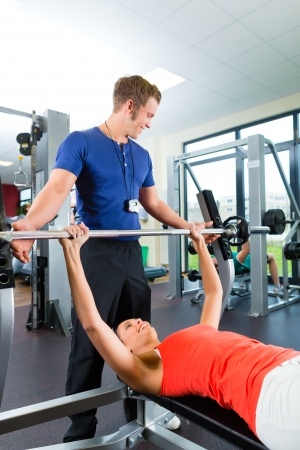

Top Tips to Find the Right Personal Trainer
Personal Injuries are a real risk for people seeking fitness at a home or gym. According to the U.S. Consumer Product Safety Commission there were 1500 visits to the emergency room from gym fitness equipment related accidents and 50,000 visits from home fitness equipment related accidents in 2009.
A qualified personal trainer can help to reduce the risk of injury by teaching proper form and keeping an eye on the intensity of the workout for the person’s fitness level.
Top Tips to Find the Right Personal Trainer
- Personal Training Certification. Trainers working at a gym may not actually be certified by a legitimate certification body; ask about their credentials. You will want a personal trainer who has a current certification and who is actively seeking out new information and classes to improve their skills. The American College of Sports Medicine, National Academy of Sports Medicine, and the American Council on Exercise are all good organizations for certification and you should be able to check your potential trainer’s certification on their website. Some personal trainers are actually certified athletic trainers and will be certified with the National Athletic Trainer’s Association. There are also strength and conditioning coaches and exercise physiologists. Ideally your personal trainer will also be currently certified in first aid, CPR, and automated external defibrillator in case of medical emergency.
- They should perform a fitness evaluation/medical history. Before you begin a workout program, a good personal trainer will perform a fitness evaluation and medical history. A Physical Activity Readiness Questionnaire (PAR-Q) can inform your personal trainer of any conditions that may affect your performance including diabetes, fibromyalgia, or asthma. Any injuries and current fitness level should be known upfront. A medical test should also be performed to determine your resting and active heart rate, your blood pressure, BMI, and starting weight. This information along with your fitness goals will inform the personal trainer about what program and exercises are best suited for you.
- Expect a tailored fitness program. The medical and fitness evaluation combined with your fitness goals should be enough for your personal trainer to design a program tailored to your needs. Every four to six weeks your personal trainer should adjust your routine to avoid stagnant progress and help you to continue to make fitness gains.
- Assess costs. If you are hiring a personal trainer through a gym then they will likely have package and single session pricing options. It is generally a better deal the more sessions you buy. The price may range from $70 to $90 per session.
- Ask for references. Before hiring a personal trainer ask them for references from former and current clients. Ask these clients about how creative the programs were, how they handled fitness concerns, and their coaching style. You should also check to see if their clients are at a similar fitness level to yours to ensure that you will be a good fit with this personal trainer.
- The personal trainer should be fit. A good personal trainer will lead by example. They should be eating healthily and working out on a regular basis themselves. Can the personal trainer handle the workouts that they are creating for you? Will they inspire you to take on a healthy lifestyle?
If you or a loved one were injured in an accident, you have enough to deal with. Let an experienced accident attorney fight for the full compensation that you deserve. It is not uncommon to receive a settlement from the insurance company that is five to ten times bigger with the help of a lawyer. Call the caring accident attorneys at Tario & Associates, P.S. in Bellingham, WA today for a FREE consultation! We have been representing residents of Whatcom County, Skagit County, Island County and Snohomish County since 1979. You will pay nothing up front and no attorney fees at all unless we recover damages for you!




